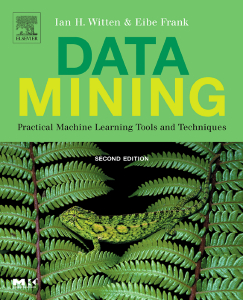 |
CS 391 - Selected Topics: Data Mining
Course Information |
Course Overview
Data mining describes a diverse area of research where techniques from machine
learning, statistics, and information theory are synthesized to classify,
cluster, interpolate, or associate large bodies of data. The practitioner
can "mine" such data for patterns or rules that facilitate greater understanding
of the data and/or facilitate intelligent response to new data. In this
course, there are several learning objectives:
- Understand of input/output for several data mining
techniques:
- classification - 1R, Naïve Bayes, top-down decision tree induction, PRISM
- association
- numeric prediction - linear regression, logistic regression, neural networks
- Experience such techniques through application of the
WEKA ("Waikato
Environment for Knowledge Analysis") software workbench and/or
implementation.
- Gain critical skills for performance evaluation of such techniques and
consideration of their ethical application
Text
Instructor
Todd Neller
Lecture: T,Th 1:10-2:25PM, Glatfelter 112
Office: Glatfelter 209
Office Hours: T,Th 10AM-12PM or by appointment.
Note:
Generally, feel free to drop in if my office door is open. If it
is closed, I'm desperately seeking to keep on top of things and rabid attack
ferrets may drop from the ceiling in my defense.
Phone: 337-6643
E-mail: 
Grading
70% Assignments
10% Quizzes/Exams
20% Class Attendance/Participation
You are responsible to know the material from each lecture and reading
assignment before the start of the next class. Homework is due at
the beginning of lecture on the due date. Late homework will not
necessarily be accepted. Code must be a legal program in the
relevant language in order to be graded. (It need not be free from logic
errors.) For compiled languages, this means that the program must compile
without error. For interpreted languages, this means it must be
interpretable without error. Class attendance
and participation is required. If you attend all classes and are
willing to participate, you'll get 100% for this part of your grade.
Even if you know enough to give a particular lecture, please consider the
value of helping your peers during in-class exercises
Honor Code
Honesty, Integrity, Honor. These are more important than anything we
will teach in this class. Students can and are encouraged to help each
other understand course concepts, but all graded work must be done independently.
The work you submit (including both code and problem solving ideas expressed
in the code) should be your independent work. For detailed information
about the honor code, see
http://www.gettysburg.edu/about/offices/provost/advising/honor_code/index.dot
.


